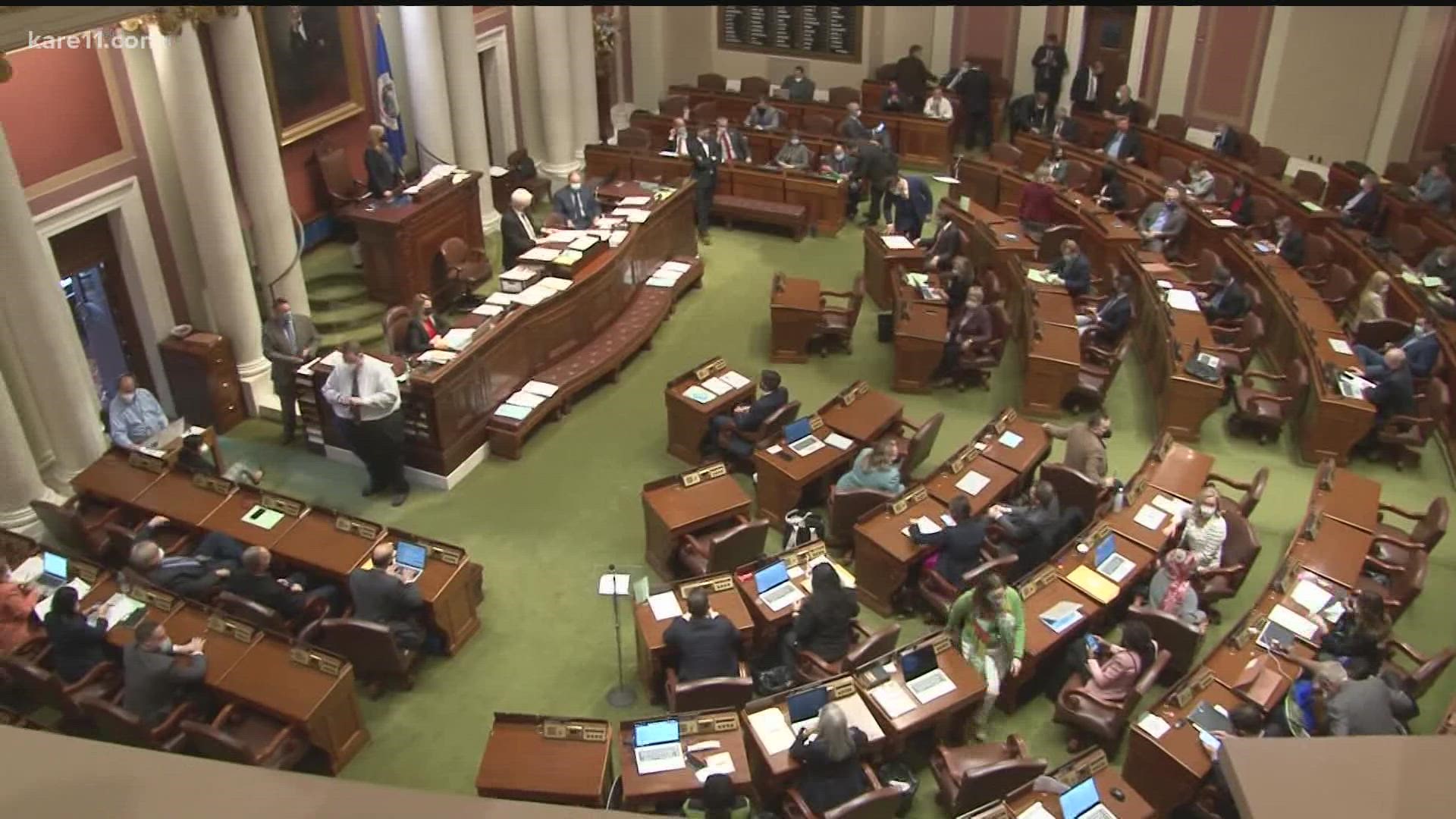ST PAUL, Minn. — Yes, it's an election year. Bitter partisan battles will be fought over control of the legislature and the governor's office in Minnesota.
But as the 2022 Session began Monday, leaders expressed optimism they will reach bipartisan agreement on some major items before they wrap things up on May 23, especially along the lines of public safety, tax relief and a construction bonding bill.
Democrats and Republicans agree part of the state's record $7.7 billion projected surplus for the current two-year budget year should be used to replenish the state's unemployment insurance trust fund.
It was depleted by COVID-related layoffs, forcing the state to borrow from the federal government to prop it up temporarily. If the legislature doesn't act to prop up unemployment insurance, the state's employers will be hit with higher quarterly payments to refill the coffers.
DFL House Speaker Melissa Hortman told reporters Monday the legislature has the power to move quickly to plug $1.2 billion into the UI Trust Fund, and also solve the frontline workers bonus stalemate that has lingered since last summer.
"We need to be careful about making a lot of financial commitments until we see the February budget forecast, but we could talk about doing some fast action with money that's already in the bank," Rep. Hortman remarked.
"In a show of good faith, Democrats and Republicans working together, we could take care of Minnesota's workers and businesses in pretty short order."
Lawmakers originally set aside $250 million of federal COVID relief money for bonus checks for frontline workers. A bipartisan working group was tasked with figuring out which categories of workers should receive checks, and how large those bonuses should be.
Republicans and Democrats were divided, with the GOP seeking larger checks for a smaller group of medical and public safety workers while DFL legislators sought smaller checks, but for a larger group of people who couldn't work from home but kept the economy running.
In light of the projected surplus, Hortman and fellow Democrats have pitched raising the total from $250 million to $1 billion, so more types of workers can be included.
Tax Relief
There's also general agreement part of the surplus should go back to taxpayers, either as permanent tax cuts or as one-time tax credits or rebate checks. Republicans typically characterize large surpluses as living proof that people have been overtaxed, although part of this surplus is from unspent federal pandemic recovery aid.
Senate Majority Leader Jeremy Miller of Winona told reporters he's open to one-time rebates, but they should be larger than the $350 checks Gov. Walz has pitched.
"It is not Gov. Walz’s money,” Miller told reporters Monday. "It’s the people’s money. It’s the taxpayers’ money."
Walz and Lt. Gov. Peggy Flanagan attracted a crowd of media Monday afternoon when they appeared on the second floor with pans of lemon bars and chocolate scotcheroos to deliver to legislators.
"No one rejected them as 'Walz Bars' or gimmicky. I'm glad of that," Walz quipped to reporters after delivering the baked goods.
He said he has a good feeling that things are going to get back to more of a normal feeling at the capitol as Minnesota moves beyond the omicron surge.
"The attitude of lawmakers is really good today. We're here to get some work done. We have some golden opportunities across a lot of priorities to get that done."
Public Safety
Democrats and Republicans have also vowed to tackle the crime wave that has gripped the nation and Minnesota, although their approaches vary quite a bit.
Republicans want to increase minimum prison sentences for carjacking and gun crimes committed by repeat offenders. Democrats want to invest in community policing -- more officers on regular beats -- and juvenile development programs.
But both parties agree local police departments need more money for investigating crimes, and more officers to work beats so they can regain the trust and confidence of the people they serve.
"We will prioritize crime prevention by ensuring law enforcement has the tools they need to serve communities and keep Minnesotans safe," Senate Minority Leader Melisa Lopez Franzen told reporters.
"At the same time, we'll continue to work with community leaders to push proven prevention strategies that we know disrupt criminal activity."
Sen. Miller stressed the GOP Senate Majority will make policing a priority.
"Law enforcement is a noble profession. Senate Republicans will continue to show our respect and appreciation for police officers and the work that they do."
Miller and other Republicans continue to blame police recruitment problems on what they call "defunding efforts" that hurt morale.
But, in truth, the Minneapolis City Council increased the police budget in the year after George Floyd's murder. And in November, Minneapolis voters soundly defeated a charter amendment to replace the police department.
The MPD's ranks fell drastically after scores of officers went on Post Traumatic Stress Disorder leaves after the civil unrest that followed Floyd's death, and many have filed workers compensation claims for lost wages due their newly diagnosed disability.
Minnesota law now treats all PTSD claims by first responders as work-related.
There's also strong desire on both sides of the aisle to pass a bonding bill for public works construction projects, although Republicans say their version will be significantly smaller than the $2.7 billion package Gov. Walz is seeking.
Watch the latest political coverage from the Land of 10,000 Lakes in our YouTube playlist:

